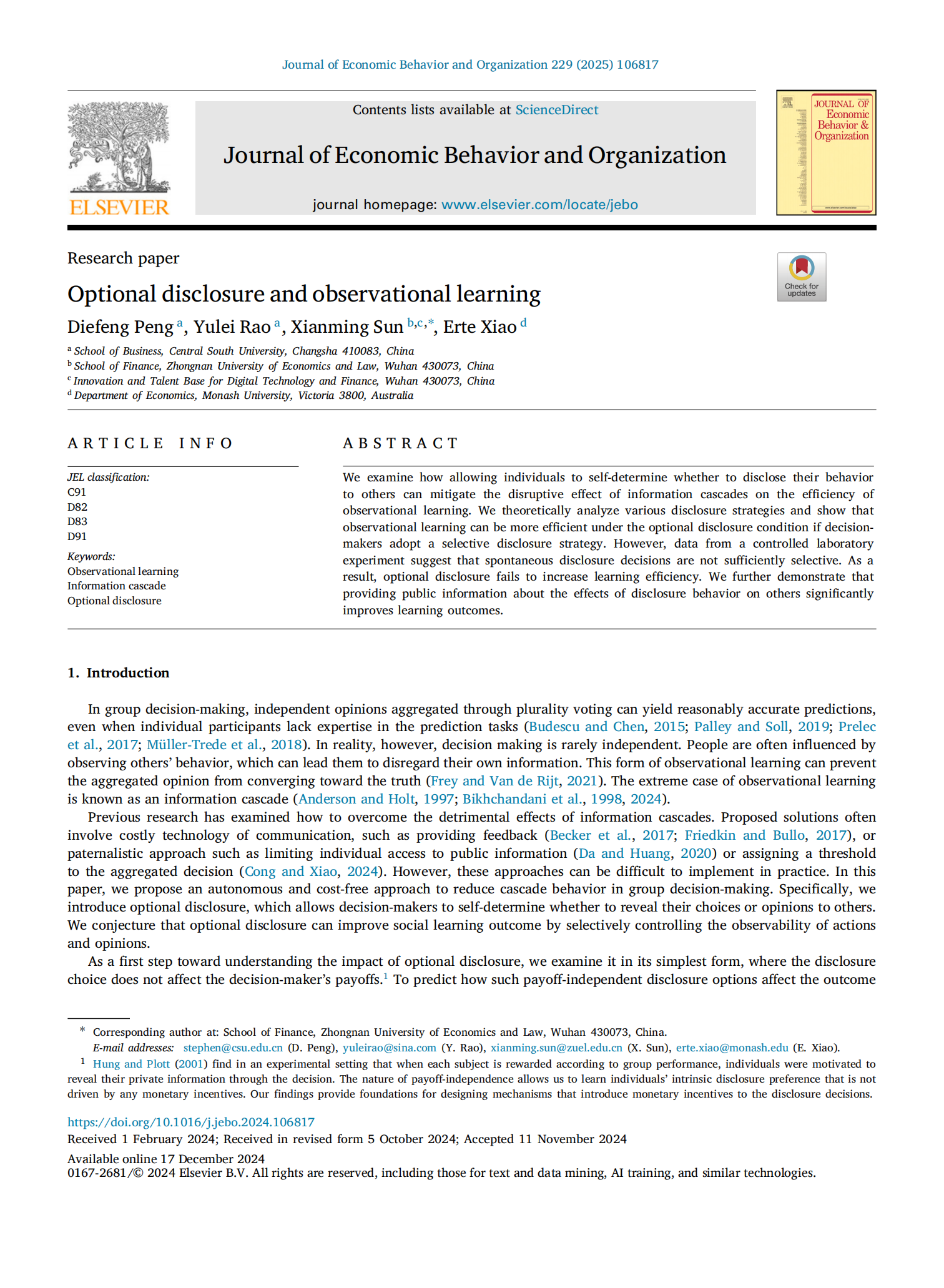The collaborative paper titled "Optional disclosure and observational learning" by Associate Professor Xianming Sun, the Executive Deputy Director of the base, has been published in the internationally renowned journal, Journal of Economic Behavior & Organization. The co-authors include Professor Diefeng Peng (Central South University), Professor Yulei Rao (Central South University), and Professor Erte Xiao (Monash University).
The Journal of Economic Behavior and Organization is a prestigious journal in the field of organizational and behavioral economics, primarily publishing research findings in areas such as economic decision-making, organizations, and behavior. It is recognized as an A-category journal by the Academic Journal Classification of Zhongnan University of Economics and Law (2023).

Abstact:We examine how allowing individuals to self-determine whether to disclose their behavior to others can mitigate the disruptive effect of information cascades on the efficiency of observational learning. We theoretically analyze various disclosure strategies and show that observational learning can be more efficient under the optional disclosure condition if decision-makers adopt a selective disclosure strategy. However, data from a controlled laboratory experiment suggest that spontaneous disclosure decisions are not sufficiently selective. As a result, optional disclosure fails to increase learning efficiency. We further demonstrate that providing public information about the effects of disclosure behavior on others significantly improves learning outcomes.
Link:https://doi.org/10.1016/j.jebo.2024.106817
Paper Introduction
In social learning scenarios, after observing the decisions of previous individuals, an individual may ignore their private information and take the same action as those before them, even if these actions contradict their own information. This phenomenon is known as an information cascade or information bandwagon, which can reduce the efficiency of social learning. For example, in financial markets, information cascades may lead investors to blindly follow trends in buying or selling stocks and other financial products, thereby triggering market volatility and risks. Therefore, how to effectively overcome the negative impact of this phenomenon on the efficiency of social learning has become an important consideration in the design of social learning scenarios.
In real-world scenarios, individuals usually have the right to decide whether to disclose their decision-making behavior. Focusing on this mechanism, this paper systematically analyzes its impact on the efficiency of social learning using theoretical modeling and behavioral experiments. The results indicate that when individuals adopt effective selective disclosure strategies, this mechanism can improve the efficiency of social learning. The relevant conclusions provide useful insights for the mechanism design of social learning scenarios.
Author profile
Xianming Sun is an associate professor and department head of the Financial Engineering Department at Zhongnan University of Economics and Law, as well as the Executive Deputy Director of the Innovation and Talent Base for Digital Technology and Finance. His research focuses on financial engineering, financial technology, and related fields, with his research findings published in journals such as Journal of Economic Dynamics and Control, Journal of Economic Behavior & Organization, Journal of Futures Markets, Accounting and Finance, and Energy Economics. He has been honored as a "Wenlan Young Scholar" at Zhongnan University of Economics and Law and has led research projects funded by the National Natural Science Foundation of China and the Fundamental Research Funds for the Central Universities. His related research has won the Excellent Paper Award at the 16th China Finance Engineering Annual Conference.
